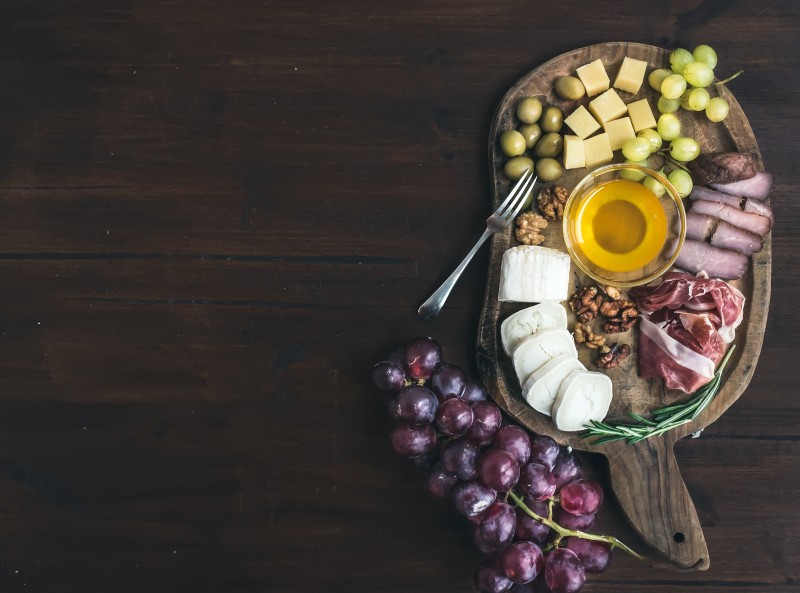
I spent the past week in Italy at a muscle conference, and while I learned lots of cool new science, the most refreshing realization was that something in the Italian water made my body feel better than it has in the past 10 years.
No, I wasn't just vacationing; I was getting up daily at 5:30 a.m., training, starting science meetings at 7:30 a.m., and then ending my jam-packed days around 10:30 p.m. to midnight (every night). I didn't change much: my energy drinks were replaced by a double espresso, my heavy strength training sessions were replaced by high rep (lower weight) lifting sessions, and my hour runs were replaced by hour walks up steep hills. Additionally, my daily non-exercise activity shifted from standing in the lab, biking into work, and running around campus to walking up and down the stairs to and from my room on the ninth floor. Other than that, I was seated in science sessions most of the day. And, my stress levels were at an all-time high.
RECENT: 4 Potent Supplements That Fight Insulin Insensitivity
But here’s the kicker: I was struggling to keep weight on. In fact, in my week abroad, I lost about five pounds despite eating the same number of calories! So what gives?
Food Quality Matters
Italy is one of the top countries for health and longevity, according to the World Health Organization. Their diet is made up of lots of high-quality food, fresh ingredients, and portions that are much smaller than you would expect at an Italian restaurant in the U.S. They also don’t really snack during the day and tend to drink a glass of wine at lunch and dinner. For a while, I couldn't understand what it was about Italy that made it so hard for me to keep weight on since I was eating the same number of calories, and then I realized: maybe it was the food quality.
In Italy, they eat lots of fresh veggies with most meals as well as a selection of cold cuts and cheese. This got me thinking: perhaps this “Italy effect” was simply the effect of eliminating processed foods from my body for a week. I was skeptical though, so I dug deeper.

sonyakamoz © 123rf.com
In the United States, a lot of our food is ultra-processed. This means it’s made from “cheap industrial sources of dietary energy and nutrients plus additives, using a series of processes.”1 In contrast, much of the food I was eating in Italy came from whole food sources and was locally grown with little to no processing.
Noticing that leaving behind processed foods was good for my waistline isn’t the first observation that’s been made between food processing and bodyweight. In fact, levels of obesity have been rising in parallel with the increasing prevalence of large-scale, high-yield, processed foods.2 I was disappointed to learn that the majority of our calories in America come from low-quality highly processed foods.3,1 The consumption of highly processed foods is associated with poor health outcomes.4,5
As of late, research has shown that eating ultra-processed foods and make you more prone to overeat and become obese.6 The combination of high sugar, salt, and fat7 is believed to drive a supernormal appetite by disrupting how your brain and gut talk to each other.8 Most importantly, in 2019, a study showed that when people are given diets of processed or non-processed foods, those eating processed foods gain more weight and eat more calories.9 The 2019 study basically suggested that eliminating ultra-processed foods could reduce food intake and increase weight loss.
To be honest, before my trip, I would have said that there was no way that just changing the quality of the calories could have such a significant impact on energy, how you feel, and how you hold onto weight. But after experiencing it myself and reading the literature, I’m a believer.
What Can Be Done?
It’s not easy to cut back on processed foods when they make up so much of what they sell at the market, but there are things you can do. For starters, try swapping your soda (diet ones, too) with carbonated water and your energy drinks with espressos. Additionally, you can reduce the amount of processed stuff you eat by cooking at home. When eating out, stick to places that serve unprocessed products, like sushi (sashimi and nigiri) and farm-to-table restaurants. Also, ditch all those “calorie-friendly” bars and products and start focusing on quality meats, veggies, fruits, and grains. Also, and the hardest one for me, ditch the artificial sweeteners.
READ MORE: 10 Tips for Managing Fat Loss Goals on the Road
These tips might not seem like much, but they can make a huge difference. So if your weight loss is stalled or if you just want to feel better, I suggest giving your diet an Italian overhaul.
References
- Monteiro, C.A., Moubarac, J.C., Cannon, G., Ng, S.W. & Popkin, B. Ultra-processed products are becoming dominant in the global food system. Obesity reviews: an official journal of the International Association for the Study of Obesity 14 Suppl 2, 21-28 (2013).
- Stuckler, D., McKee, M., Ebrahim, S. & Basu, S. Manufacturing epidemics: the role of global producers in increased consumption of unhealthy commodities including processed foods, alcohol, and tobacco. PLoS medicine 9, e1001235 (2012).
- Martinez Steele, E. et al. Ultra-processed foods and added sugars in the US diet: evidence from a nationally representative cross-sectional study. BMJ open 6, e009892 (2016).
- Fiolet, T. et al. Consumption of ultra-processed foods and cancer risk: results from NutriNet-Sante prospective cohort. Bmj 360, k322 (2018).
- Mendonca, R.D. et al. Ultraprocessed food consumption and risk of overweight and obesity: the University of Navarra Follow-Up (SUN) cohort study. The American journal of clinical nutrition 104, 1433-1440 (2016).
- Poti, J.M., Braga, B. & Qin, B. Ultra-processed Food Intake and Obesity: What Really Matters for Health-Processing or Nutrient Content? Current obesity reports 6, 420-431 (2017).
- Poti, J.M., Mendez, M.A., Ng, S.W. & Popkin, B.M. Is the degree of food processing and convenience linked with the nutritional quality of foods purchased by US households? The American journal of clinical nutrition 101, 1251-1262 (2015).
- Schulte, E.M., Avena, N.M. & Gearhardt, A.N. Which foods may be addictive? The roles of processing, fat content, and glycemic load. PloS one 10, e0117959 (2015).
- Hall, K.D. et al. Ultra-Processed Diets Cause Excess Calorie Intake and Weight Gain: An Inpatient Randomized Controlled Trial of Ad Libitum Food Intake. Cell metabolism (2019).











I could see some reduction in inflammation if your normal diet was full of processed foods and you react badly to them.